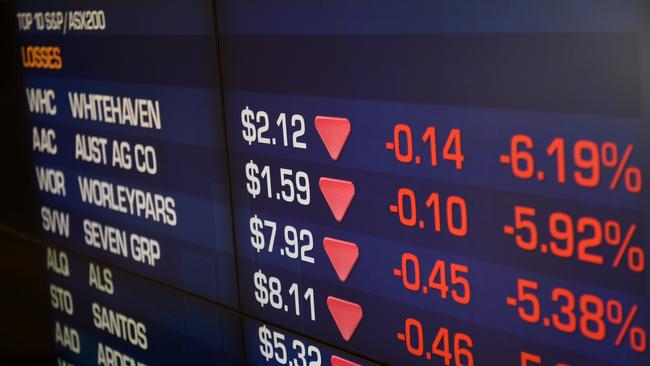Super funds suffer rare decline in 2022: SuperRatings
Super funds have endured a rare decline in annual returns, but members should have faith in their overall strong long-term performance, according to SuperRatings.

Business
Don't miss out on the headlines from Business. Followed categories will be added to My News.
Super funds limped to the end of 2022 deep in the red, with market turbulence delivering negative annual returns for only the fourth time since 2000.
The median balanced fund returned negative 4.8 per cent for the 12 months through to the end of December, with property and equities to blame for much of the decline, according to research house SuperRatings.
Just two balanced options delivered positive returns for the year: The Perpetual Balanced Growth Fund, with a 1.7 per cent return, and First Super’s balanced option, which eked out a 0.1 per cent gain.
Among the other top 20 funds for the year, which include Hostplus, Australian Retirement Trust and Hesta, the returns ranged from between negative 2 per cent and negative 4.4 per cent.
But the nation’s largest super fund, the $130bn AustralianSuper, failed to deliver any outperformance, instead returning negative 4.8 per cent in line with the median result.
It is just the fourth time balanced funds recorded a full calendar year of negative growth, with 2022’s performance outstripping the negative 1.9 per cent returned in 2011 and in line with the negative 4.8 per cent delivered in 2002. Still, none compares to the negative 20 per cent recorded in 2008.

Balanced funds were hit with simultaneous falls in stocks and bonds in 2022. These funds typically allocate about 70 per cent of their assets to stocks and about 30 per cent bonds.
Economic reopening combined with unprecedented stimulus and supply chain disruption during the Covid-19 pandemic caused persistently high inflation, which led to aggressive interest rate hikes by the world’s major central banks through the year, including the Reserve Bank of Australia.
“Super funds experienced a turbulent 2022 with heightened inflation driving ongoing interest rate rises and throwing international markets into periods of significant uncertainty,” said SuperRatings executive director Kirby Rappell.
Mr Rappell said the disappointing returns were driven by falls in property and international shares, further impacted by fixed interest failing to act as a safety net.
Looking back on the dismal year for fund returns, Mr Rappell pointed to the long-term performance of super.
“While members may be disappointed with this year’s performance, if we look at the long term, funds continue to perform well against objectives,” he said.
“With more uncertainty ahead, it remains important to set your strategy and try to ignore the current market noise to increase the odds of long term success.”
Long-term, super returns have averaged 6.1 per cent a year since 2000.
Hostplus’s balanced option has been the top performer over the long-term, with an average annual return of 9.1 per cent. This is followed by AustralianSuper and Australian Retirement Trust, with average yearly returns of 8.8 per cent and 8.6 per cent.
“We expect more ups and downs for markets over the coming months, with the path of inflation and the related interest rate movements remaining the key driver for whether funds can provide a positive return to members or not,” Mr Rappell said.
“It’s a good time for members to consider the level of ups and downs they are willing to tolerate and do a health check on their fund across performance, fees and insurance.
“For members seeking a less bumpy ride there is a silver lining with cash returns expected to rise to around 4-5 per cent, however while a significant improvement on the last few years, expected cash returns remain lower than inflation.”
Mr Rappell also tipped further consolidation in the industry.
“We continue to see funds merging and investment menus consolidating, but there remains a large number of products across the market,” he said.
Originally published as Super funds suffer rare decline in 2022: SuperRatings




